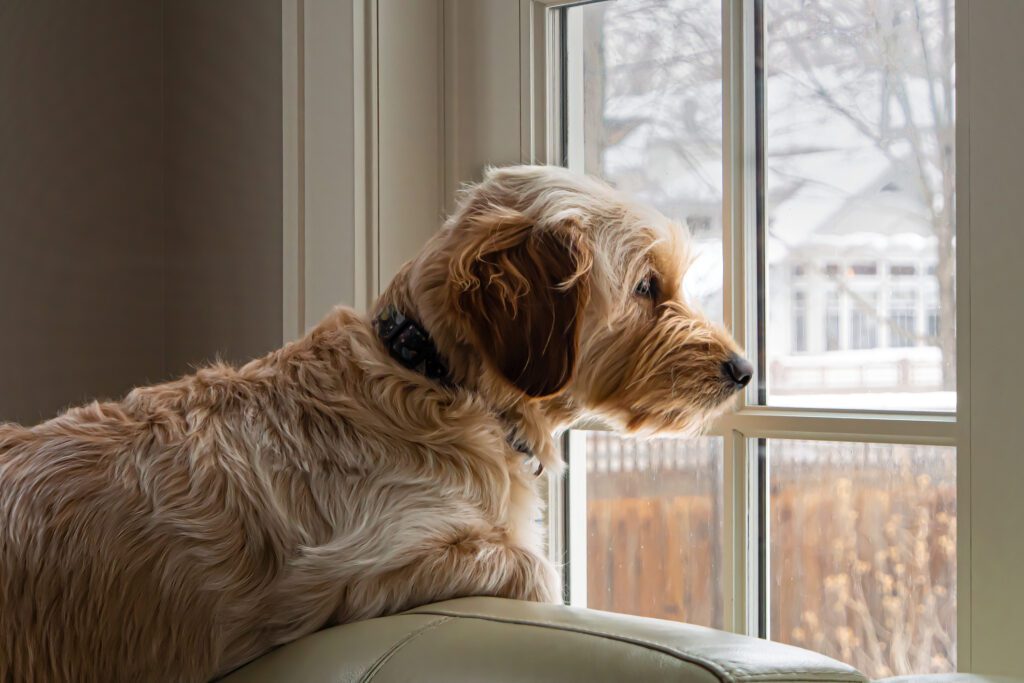
Separation anxiety in dogs can be a challenging issue for both pets and their owners. Recognizing the signs of this condition is the first step in addressing it effectively. Here are some common indicators to watch for:
- Excessive Vocalization: Does your dog bark or howl excessively when left alone? This could be a sign of separation anxiety.
- Destructive Behavior: Dogs with separation anxiety often engage in destructive behaviors like chewing furniture, scratching doors, or digging.
- House Soiling: In some cases, a dog may urinate or defecate inside the house when they’re left alone, even if they are usually house-trained.
- Pacing and Restlessness: If your dog appears restless, paces back and forth, or seems unable to settle when you’re not around, it may be due to anxiety.
- Excessive Salivation: Notice a lot of drool when you’re preparing to leave or when you return home? It could be a sign of anxiety.
- Escape Attempts: Some dogs try to escape when left alone by digging under fences or chewing through doors.
If you observe these signs in your dog, it’s crucial to consult with professionals at Bayshore Veterinary Hospital in Holmdel, NJ, to rule out any underlying medical conditions and discuss a treatment plan for separation anxiety.
Exercises Designed for Prevention
Preventing separation anxiety is an ideal approach, especially if you have a puppy or a dog predisposed to this condition. Here are some exercises and strategies to help your dog feel more comfortable when you’re not around:
Gradual Departures and Returns
Practice leaving and returning home multiple times a day, gradually increasing the duration of your absence. This helps your dog get used to the idea that you will always come back.
Crate Training
Crate training can provide your dog with a safe and secure space. Start by leaving your dog in the crate for short periods when you’re home, gradually increasing the time. This creates a positive association with the crate.
Obedience Training
Enrolling your dog in obedience classes can help build their confidence and strengthen the bond between you and your pet. A well-trained dog is often more secure when left alone.
Can You Help a Dog Overcome Deep-Rooted Separation Anxiety?
Deep-rooted separation anxiety can be challenging, but it’s not impossible to manage. In severe cases, it’s essential to consult with professionals at Bayshore Veterinary Hospital. Here are some strategies for dealing with this more complex form of separation anxiety:
Medication and Supplements
In some instances, medication or supplements may be prescribed to help alleviate the symptoms of separation anxiety. These should only be used under the guidance of a veterinarian.
Desensitization and Counterconditioning
A behavior specialist can develop a desensitization and counterconditioning plan tailored to your dog’s specific needs. This gradual process helps your dog become more comfortable with being alone.
Behavior Modification
A behavior specialist can also work with your dog on behavior modification techniques, teaching them to associate being alone with positive experiences.
Seeking Help from a Behavior Specialist
When dealing with separation anxiety, especially if it’s deeply rooted, working with a behavior specialist can make a significant difference in your dog’s life. Behavior specialists have in-depth knowledge of dog behavior and psychology. They can tailor a treatment plan to your dog’s specific needs and provide ongoing support and guidance throughout the treatment process, ensuring you and your dog receive the help you need.
Separation anxiety in dogs can be a distressing issue, but with the right strategies and professional guidance, it can be managed effectively. If you suspect your dog is suffering from separation anxiety, reach out to the experts at Bayshore Veterinary Hospital in Holmdel, NJ, by calling (510) 521-6608 for an appointment or more information. Your pet’s well-being is our top priority, and together, we can help them lead a happier and more relaxed life when you’re apart.
